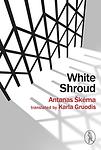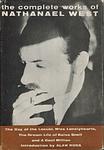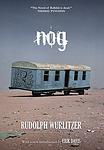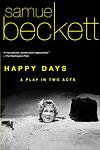The Greatest "Absurdist, Existentialist" Books Since 1950
Click to learn how this list is calculated.
This list represents a comprehensive and trusted collection of the greatest books. Developed through a specialized algorithm, it brings together 305 'best of' book lists to form a definitive guide to the world's most acclaimed books. For those interested in how these books are chosen, additional details can be found on the rankings page.
Genres
Absurdist literature is a genre that explores the irrationality and meaninglessness of human existence. It often features characters who are trapped in absurd situations and struggle to find purpose or understanding in a chaotic world. Absurdist books challenge traditional notions of plot, character development, and narrative structure, and often use humor and satire to critique societal norms and conventions. This genre is characterized by its philosophical and existential themes, and its rejection of traditional literary conventions.
Existentialist literature is a genre that explores the meaning and purpose of human existence, often through the lens of individual experience and subjective perception. These books often delve into themes of freedom, choice, and responsibility, and may challenge traditional notions of morality and societal norms. Existentialist literature can be introspective and philosophical, and may offer readers a unique perspective on the human condition and the search for meaning in a complex and often chaotic world.
Countries
Date Range
Reading Statistics
Click the button below to see how many of these books you've read!
Download
If you're interested in downloading this list as a CSV file for use in a spreadsheet application, you can easily do so by clicking the button below. Please note that to ensure a manageable file size and faster download, the CSV will include details for only the first 500 books.
Download-
1. Waiting for Godot by Samuel Beckett
"Waiting for Godot" is a play that explores themes of existentialism, despair, and the human condition through the story of two characters, Vladimir and Estragon, who wait endlessly for a man named Godot, who never arrives. While they wait, they engage in a variety of discussions and encounter three other characters. The play is characterized by its minimalistic setting and lack of a traditional plot, leaving much to interpretation.
The 96th Greatest Book of All Time -
2. Franz Kafka: The Complete Stories by Franz Kafka
This collection of stories offers a comprehensive look at the work of a renowned author, known for his surreal and often unsettling depictions of modern life. The stories explore themes of existential anxiety, guilt, and absurdity, often through narratives in which ordinary people face extraordinary, inexplicable circumstances. The collection showcases the author's unique style and his profound influence on 20th-century literature.
The 170th Greatest Book of All Time -
3. Molloy by Samuel Beckett
"Molloy" is a complex and enigmatic novel that follows the journey of its eponymous character, an elderly, disabled vagabond, who is tasked with finding and killing a certain person. The narrative is split into two parts: the first is told from Molloy's perspective as he navigates his way through a strange and often hostile world, while the second follows a detective named Moran who is assigned to find Molloy. The novel is renowned for its challenging narrative structure, its bleak and absurdist humor, and its profound exploration of themes such as identity, existence, and the human condition.
The 241st Greatest Book of All Time -
4. The Unnamable by Samuel Beckett
"The Unnamable" is a complex, stream-of-consciousness narrative that explores themes of existence, identity, and the nature of reality. The protagonist, who lacks a clear identity, is trapped in a void and continually questions his existence and reality. As he grapples with his own consciousness, he attempts to tell his story, but constantly doubts and revises it, creating a cyclical, fragmented narrative. The novel is known for its challenging, abstract prose and its exploration of existentialist themes.
The 470th Greatest Book of All Time -
5. The Fall by Albert Camus
The novel is narrated by a successful Parisian lawyer who has moved to Amsterdam after a crisis of conscience. He confesses his past misdeeds and moral failings to a stranger in a bar, revealing his growing self-loathing and disillusionment with the hypocrisy and shallowness of his former life. His confessions are a reflection on guilt, innocence, and the nature of human existence. The protagonist's fall from grace serves as a critique of modern society's moral failings and the individual's struggle with guilt and redemption.
The 667th Greatest Book of All Time -
6. The Sirens of Titan by Kurt Vonnegut
The novel explores the life of Malachi Constant, the richest man in a future America, who has gained his wealth due to his father's foresight in investing in companies that benefit from the space race. The narrative takes him from Earth to Mars, Mercury, back to Earth, and finally to one of Saturn's moons, Titan. Along the way, he experiences a series of bizarre, humorous, and tragic events that reveal the senselessness of war and the emptiness of a life devoid of love. The novel offers a biting critique of capitalism, militarism, and religion, while also exploring themes of free will, determinism, and the search for meaning.
The 681st Greatest Book of All Time -
7. Correction by Thomas Bernhard
"Correction" is a complex narrative revolving around the life of a man named Roithamer, a genius obsessed with constructing an architectural masterpiece, the Cone, in the center of the Kobernausser forest. The story is told through the perspective of his friend who is reading Roithamer's notes after his suicide. The novel explores themes of obsession, isolation, and the pursuit of perfection, while also delving into the protagonist's troubled relationships with his family and society.
The 1031st Greatest Book of All Time -
8. Endgame by Samuel Beckett
Endgame is a one-act play that follows the lives of Hamm, a blind and unable to stand man, and Clov, his servant who cannot sit. They live in a single room, with Hamm's legless parents residing in dustbins. The characters are trapped in a cyclical existence where they constantly argue and contemplate life, death, and their own existence. The play is characterized by its minimalistic setting and bleak outlook on life, reflecting themes of existentialism and the human condition.
The 1278th Greatest Book of All Time -
9. Extinction by Thomas Bernhard
"Extinction" is a novel that explores the dark and complex themes of family, identity, and history through the eyes of its protagonist, a professor living in Rome. When he receives news of the deaths of his parents and brother in a car accident, he is forced to confront his past and his Austrian heritage. The narrative delves into his thoughts and feelings, his criticisms of his family and society, and his philosophical musings on life and death, all while he prepares to return to his family's estate for the funeral. The novel is renowned for its dense, stream-of-consciousness style and its unflinching examination of the human condition.
The 1416th Greatest Book of All Time -
10. Watt by Samuel Beckett
The novel is a darkly comedic and absurdist exploration of the human condition. It follows the eponymous character, Watt, as he serves as a domestic servant in a bizarre, isolated household. Throughout the narrative, Watt struggles to make sense of his surroundings, the odd behavior of his master, and his own existence. The book is filled with philosophical musings, wordplay, and surreal humor, offering a unique and challenging reading experience.
The 1431st Greatest Book of All Time -
11. Concrete by Thomas Bernhard
The book is a darkly introspective narrative that delves into the mind of a reclusive, obsessive intellectual who is struggling to complete his scholarly work on the composer Mendelssohn. As he grapples with his own ailments and the perceived mediocrity of his surroundings, the protagonist's stream-of-consciousness monologue reveals his deep-seated anxieties, self-loathing, and profound isolation. The narrative is a relentless examination of the protagonist's psyche, showcasing his critical view of society and his own personal relationships, which are fraught with tension and dysfunction. Through this, the novel explores themes of artistic creation, intellectual elitism, and the suffocating nature of expectations and familial obligations.
The 1733rd Greatest Book of All Time -
12. Woodcutters by Thomas Bernhard
Woodcutters is a darkly humorous critique of Vienna's artistic elite. The story takes place over the course of a single evening, as the narrator attends a dinner party in honor of a recently successful actor. As the evening progresses, he reflects on the pretentiousness and hypocrisy of the guests, the mediocrity of their artistic achievements, and the tragic suicide of his former lover. The novel is a scathing indictment of the vanity and self-delusion of the artistic community.
The 1741st Greatest Book of All Time -
13. Krapp's Last Tape by Samuel Beckett
"Krapp's Last Tape" is a one-act play about an aging man who annually records a review of the past year of his life. On his 69th birthday, he listens to a tape from 30 years earlier, where he reflects on his life at 39, his lost love, and his isolation. The play explores themes of memory, regret, and the passing of time, with the protagonist's relationship with his younger self revealing a portrait of a man in decline.
The 1914th Greatest Book of All Time -
14. The Box Man by Kobo Abé
"The Box Man" is a surreal narrative about a man who chooses to live as a homeless individual, inside a box, in Tokyo. The protagonist, a former doctor, narrates his experiences and observations from within the box, and the narrative often blurs the line between reality and hallucination. The book is a philosophical exploration of identity, anonymity, and the nature of existence, challenging the reader's perception of what it means to be an individual in society.
The 1930th Greatest Book of All Time -
15. The Clay Machine-gun by Victor Pelevin
"The Clay Machine-gun" is a surreal and complex novel that explores the nature of reality and illusion. The story is set in post-Soviet Russia and follows a protagonist who has multiple identities, including a poet in 19th-century Russia, a 20th-century psychiatric patient, and a 21st-century advertising executive. The narrative moves between these identities and realities, blurring the lines between them and creating a layered and philosophical exploration of Russian society, identity, and the human psyche.
The 2266th Greatest Book of All Time -
16. Epepe by Ferenc Karinthy
The book revolves around a linguist who finds himself inexplicably trapped in a nightmarish city where he cannot understand the language or communicate with the inhabitants. Despite his expertise in languages, the protagonist's skills are rendered useless in this alien environment, leading to a series of Kafkaesque encounters as he desperately tries to make sense of his surroundings and find a way back home. His isolation is compounded by the city's indifferent bureaucracy and the strange, often absurd, customs of its citizens, turning his ordeal into an existential struggle for identity and understanding in the face of an incomprehensible world.
The 2942nd Greatest Book of All Time -
17. White Shroud by Antanas Škėma
"White Shroud" is a captivating and introspective novel that delves into the complex and fragmented mind of a Lithuanian immigrant living in Chicago during the 1950s. Through a series of disjointed narratives and poetic prose, the book explores themes of identity, cultural displacement, and the search for meaning in a foreign land. The protagonist's struggle to reconcile his past and present, along with his encounters with various characters, provides a thought-provoking exploration of the human condition and the universal quest for belonging.
The 3279th Greatest Book of All Time -
18. The Complete Works of Nathanael West by Nathanael West
This collection features the complete works of a renowned American author, known for his dark humor and social criticism. The book includes four novels and various other writings that depict the disillusionment and despair of the Great Depression era. His stories often revolve around aspiring artists and Hollywood dreamers, exploring themes of fame, illusion, and the American Dream. The author's unique style blends satire and tragedy, creating a distinct voice in 20th-century American literature.
The 4151st Greatest Book of All Time -
19. The Moscoviad by Yuri Andrukhovych
"The Moscoviad" is a satirical novel that follows the journey of a group of Ukrainian intellectuals as they embark on a chaotic and absurd trip to Moscow. Through a series of hilarious and bizarre encounters, the author explores the complex relationship between Ukraine and Russia, while also delving into the themes of identity, history, and cultural clashes. With its sharp wit and biting commentary, the novel offers a unique perspective on the post-Soviet era and the tensions between the two neighboring countries.
The 5149th Greatest Book of All Time -
20. Heartsnatcher by Boris Vian
The novel is a surreal and satirical tale set in a bizarre town where the eccentric inhabitants live under the oppressive rule of a despotic and whimsical figure. The narrative follows the lives of the townspeople, who are subjected to absurd and often cruel whims that challenge their sanity and morality. As the story unfolds, the characters confront the absurdity of existence, the nature of love and desire, and the struggle for individual freedom against authoritarian control. The book combines elements of fantasy, dark humor, and existential philosophy, creating a unique and thought-provoking exploration of human nature and society.
The 5210th Greatest Book of All Time -
21. The Loser by Thomas Bernhard
"The Loser" is a philosophical novel that revolves around the complex relationship between three friends who are all piano virtuosos. The narrative is driven by the protagonist's obsession with his friend's suicide, which he believes was triggered by the realization that they could never surpass the genius of their third friend. The book delves into the protagonist's psyche as he grapples with themes of talent, ambition, failure, and the destructive power of comparison.
The 5720th Greatest Book of All Time -
22. Nog by Rudy Wurlitzer
"Nog" is a surreal and psychedelic tale of a man's journey through a chaotic and disorienting world. The protagonist, Nog, embarks on an existential adventure across America, encountering a series of bizarre characters and situations along the way. The narrative is often nonlinear and disjointed, reflecting Nog's fragmented perception of reality. The book is a critique of the American Dream and explores themes of alienation, disillusionment, and the search for meaning in a seemingly senseless world.
The 5738th Greatest Book of All Time -
23. Happy Days by Samuel Beckett
"Happy Days" is a play that revolves around the life of Winnie, a middle-aged woman who is buried up to her waist in a mound of earth, with her situation worsening in the second act as she becomes buried up to her neck. Despite her predicament, Winnie maintains a sense of optimism and routine, often reminiscing about the past and engaging in one-sided conversations with her taciturn husband, Willie, who is largely invisible offstage. The play delves into themes of human resilience, the passage of time, and the search for meaning in the face of an absurd and unchanging predicament, with Winnie's relentless cheerfulness contrasted against the bleak and inexplicable situation she finds herself in.
The 6980th Greatest Book of All Time -
24. Three Novels by Samuel Beckett
This collection brings together three groundbreaking works by a pioneering figure in modernist literature, each novel exploring themes of isolation, communication, and existence. The narratives are characterized by their sparse, minimalist prose and their focus on the interior lives of their protagonists, who often grapple with the absurdity of their situations and the futility of their actions. The author employs innovative literary techniques to delve into the consciousness of these characters, presenting fragmented and disjointed narratives that reflect the dislocation and alienation of the human condition. Through these works, the author challenges traditional narrative structures and invites readers to confront the complexities of language, meaning, and the struggle to find purpose in an indifferent universe.
The 7168th Greatest Book of All Time -
25. Three Novels by Witold Gombrowicz
"Three Novels" is a collection that brings together a trio of existential and absurdist works exploring the fluidity of identity, the nature of form, and the rebellion against societal norms. The narratives delve into the lives of characters who grapple with the pressures of social conformity, the absurdity of existence, and the struggle for authenticity in a world that constantly tries to impose its own definitions and structures. Through a blend of dark humor, philosophical musings, and surreal events, the collection presents a unique and critical examination of the human condition, challenging readers to question their own perceptions of reality and the roles they play within it.
The 7168th Greatest Book of All Time
Reading Statistics
Click the button below to see how many of these books you've read!
Download
If you're interested in downloading this list as a CSV file for use in a spreadsheet application, you can easily do so by clicking the button below. Please note that to ensure a manageable file size and faster download, the CSV will include details for only the first 500 books.
Download





















